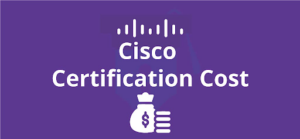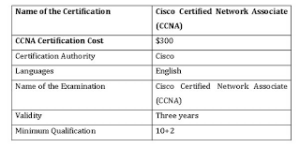Introduction
Earning the Cisco Certified Network Associate (CCNA) certification is a significant achievement for IT professionals seeking to advance their careers in networking. Aspiring candidates often wonder about the financial investment required to undertake the CCNA certification exam. In this blog post, we’ll explore how much the CCNA certification exam costs in 2024, shedding light on the factors influencing the expenses. Whether you’re a seasoned professional or a beginner to the world of Cisco networking, understanding the financial aspects of pursuing the CCNA certification is important for effective career planning.

Overview of CCNA Certification
The CCNA certification, offered by Cisco, is a foundational certification that validates the skills and knowledge required to operate, troubleshoot, and secure small to medium-sized enterprise networks. It envelopes a broad range of networking topics, which includes routing and switching, security, wireless networking, and more. Achieving CCNA certification signifies a solid understanding of Cisco networking technologies making it a valuable credential for IT professionals.

Breaking Down the CCNA Certification Exam Cost:
- Exam Fee:
As of 2024, the CCNA certification exam cost typically falls within the range of $300 to $325 USD. This fee is a critical component of the overall investment and covers the expense of taking the exam. It’s essential to check Cisco’s official website for the most up-to-date pricing information.
- Study Materials:
Efficient preparation is key to success in the CCNA exam. Acquiring study materials, such as official Cisco press books, online courses, and practice exams, is an integral part of the procedure. While there are numerous free and paid resources available, candidates may choose to invest in an illustrative study guide, which ranges from $50 to $100 or more.
- Training Courses:
Many candidates opt for formal training courses to boost their knowledge and skills. Cisco and various third-party offers instructor-led or self-paced courses designed specifically for CCNA preparation. The cost of these courses can vary widely, which ranges from a few hundred to over thousand dollars, depending on the format, duration, and the reputation of the training provider.
- Practice Exams:
To gauge readiness for the CCNA exam, practice exams are invaluable. Investing in reputable practice exam platforms can provide a realistic simulation of the actual test environment. Prices for practice exams typically range from $30 to $100, which depends on the number of practice tests and additional features included.
- Lab Equipment or Simulators:
Hands-on experience is crucial for mastering networking concepts. Some candidates may choose to invest in physical lab equipment, such as routers and switches, while others may opt for virtual lab simulators. The cost of lab equipment can vary significantly, with virtual labs often being a more cost-effective option.
- Retake Fees:
While everyone aims to pass the CCNA exam on the first attempt, it’s wise to factor in the possibility of retakes. Cisco charges a fee for each retake, typically around the same amount as the initial exam fee. Planning for this contingency ensures a realistic budget and helps alleviate potential financial stress.
The Value of CCNA Certification
While the cost of pursuing CCNA certification may seem like a considerable investment, it’s essential to view it as an investment in your career. CCNA-certified professionals are highly sought after in the IT industry, and the certification serves as a testament to your skills and knowledge in networking in networking technologies. The doors it opens to career advancement and job opportunities often outweigh the initial financial outlay.
Conclusion
As you embark on the journey to earn your CCNA certification in 2024, understanding the associated costs is crucial for effective planning. By budgeting for exam fees, study materials, training courses, and potential retakes, you can approach the certification process with confidence, knowing that you’re making a strategic investment in your professional growth.





No comment yet, add your voice below!